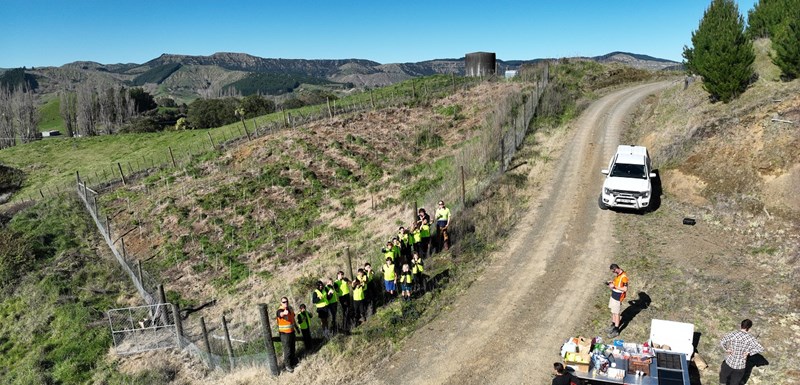
Tutira School dig in to protect endangered kakabeak
Tutira School students recently joined Matariki Forests’ on their mission to protect one of New Zealand’s rarest plants.
Following the random discovery of a kakabeak (Clianthus maximus) plant in Willowflat Forest, by the company’s contractors in 2012, Matariki Forests has worked with Forest Life Force Restoration Trust, Department of Conservation, James Powrie and native tree nursery, Plant Hawkes Bay, to establish an ongoing seed collection and propagation programme, thus contributing to the seed bank.
Luke Herbert, Matariki Forests Hawkes Bay Harvest Operations Coordinator, says years of dedication have paid off with approximately 80 kakabeak now successfully living in the protected enclosure in Lakeview Forest.
“It is an ongoing challenge to grow and protect kakabeak in the wild, particularly given that it is hugely appealing to a whole host of pests, including snails, slugs, rabbits, deer, pigs and goats that will often browse the plant to the point of killing it. So when we were ready to plant out the seedlings, which originated from wild stock some years ago, we built an enclosure to keep out as many of them as possible. Three years on, most of the kakabeak are surviving but still require replenishing as they can die off easily. It’s an ongoing labour of love but one we hope will contribute to the seedbank once the plants start producing seed,” says Luke.
Matariki Forests wanted to share this special space with local Tutira School and invited the children to join the team in a planting day which involved planting a selection of native plants around the kakabeak to provide shelter and protection.
“We wanted to offer the enclosure to the children to access for field trips and learning opportunities. They did an outstanding job of helping us plant out the natives and they will be involved in ongoing maintenance, so they get hands-on experience caring for plants and gain an understanding of conservation and biodiversity,” explains Luke.
Tutira School principal, Lynne Horrobin, says the planting day was a rewarding and educational experience for the children.
“It was a very special day filled with valuable lessons. Everything from learning about health and safety protocols to pest control and how to plant a seedling was met with great enthusiasm by the children and the BBQ lunch was a bonus,” says Lynne.
“We want them to understand that doing things for the community is really positive and it brings a real sense of connectivity and responsibility. Many of them can’t wait to return to carry out ongoing maintenance.”
Tutira School is planning on starting a native nursery to grow seedlings for the community.
“Growing native plants from seeds is a little more tricky than other species but once we’ve mastered it, we want to plant more natives around the school and donate to other projects in the community,” says Lynne.
“Matariki Forests kindly donated some native trees for us to plant on our State Highway 2 border to help mute traffic noise. So we look forward to building on that work once we’re up and running.”
